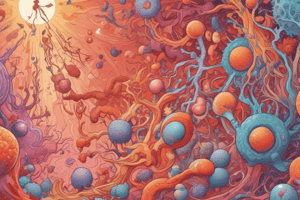Podcast
Questions and Answers
What is the primary function of the body's immune system in response to injury or infection?
What is the primary function of the body's immune system in response to injury or infection?
- To induce chronic inflammation
- To suppress the immune system
- To initiate a natural response of inflammation (correct)
- To promote tissue damage
Which of the following is NOT a cause of inflammation?
Which of the following is NOT a cause of inflammation?
- Hormonal imbalance (correct)
- Injury
- Infection
- Autoimmune disorders
What is characteristic of acute inflammation?
What is characteristic of acute inflammation?
- Release of anti-inflammatory cytokines
- Decreased blood flow to the affected area
- Fibrosis and tissue damage
- Increased permeability of blood vessels (correct)
What are the classic symptoms of inflammation?
What are the classic symptoms of inflammation?
What type of cytokine regulates inflammation?
What type of cytokine regulates inflammation?
What is the purpose of chemokines in inflammation?
What is the purpose of chemokines in inflammation?
What is the resolution phase of inflammation characterized by?
What is the resolution phase of inflammation characterized by?
What is the function of regulatory mechanisms in inflammation?
What is the function of regulatory mechanisms in inflammation?
Study Notes
Definition and Causes
- Inflammation is a natural response of the body's immune system to injury, infection, or damage.
- It is a complex biological process involving various cell types, chemical mediators, and tissues.
- Causes of inflammation include:
- Infection (bacterial, viral, fungal)
- Injury (physical, thermal, chemical)
- Autoimmune disorders (e.g., rheumatoid arthritis, lupus)
- Allergic reactions
- Environmental factors (e.g., pollution, UV radiation)
Stages of Inflammation
- Acute inflammation: immediate response to injury or infection, characterized by:
- Increased blood flow to the affected area
- Increased permeability of blood vessels
- Migration of white blood cells (leukocytes) to the site
- Release of chemical mediators (e.g., histamine, bradykinin)
- Chronic inflammation: prolonged inflammation, often associated with:
- Tissue damage and repair
- Fibrosis (scarring)
- Immune system dysregulation
Signs and Symptoms
- Cardinal signs: classic symptoms of inflammation:
- Redness (rubor)
- Swelling (tumor)
- Heat (calor)
- Pain (dolor)
- Loss of function (functio laesa)
- Other symptoms may include:
- Fever
- Fatigue
- Muscle weakness
- Joint stiffness
Chemical Mediators
- Cytokines: signaling molecules that regulate inflammation:
- Pro-inflammatory cytokines (e.g., TNF-α, IL-1β)
- Anti-inflammatory cytokines (e.g., IL-10, TGF-β)
- Chemokines: chemotactic cytokines that attract immune cells:
- CXCL8 (IL-8)
- CCL2 (MCP-1)
- Eicosanoids: lipid-derived mediators:
- Prostaglandins (e.g., PGE2)
- Leukotrienes (e.g., LTB4)
Resolution of Inflammation
- Resolution phase: the process of returning to homeostasis:
- Clearance of inflammatory mediators
- Resolution of tissue damage
- Restoration of tissue function
- Regulatory mechanisms: mechanisms that regulate inflammation:
- Immune suppression (e.g., Tregs, cytokine regulation)
- Anti-inflammatory cytokines (e.g., IL-10, TGF-β)
- Resolution of inflammation through specialized pro-resolving mediators (SPMs)
Inflammation Definition and Causes
- Inflammation is a natural immune response to injury, infection, or damage.
- It's a complex biological process involving various cell types, chemical mediators, and tissues.
- Causes of inflammation include:
- Infection (bacterial, viral, fungal)
- Injury (physical, thermal, chemical)
- Autoimmune disorders (e.g., rheumatoid arthritis, lupus)
- Allergic reactions
- Environmental factors (e.g., pollution, UV radiation)
Stages of Inflammation
- Acute Inflammation:
- Immediate response to injury or infection
- Characterized by increased blood flow, permeability, and white blood cell migration
- Release of chemical mediators (e.g., histamine, bradykinin)
- Chronic Inflammation:
- Prolonged inflammation often associated with tissue damage and repair
- Fibrosis (scarring) and immune system dysregulation
Signs and Symptoms
- Cardinal Signs:
- Redness (rubor)
- Swelling (tumor)
- Heat (calor)
- Pain (dolor)
- Loss of function (functio laesa)
- Other symptoms may include:
- Fever
- Fatigue
- Muscle weakness
- Joint stiffness
Chemical Mediators
- Cytokines:
- Pro-inflammatory cytokines (e.g., TNF-α, IL-1β)
- Anti-inflammatory cytokines (e.g., IL-10, TGF-β)
- Chemokines:
- Attract immune cells (e.g., CXCL8, CCL2)
- Eicosanoids:
- Prostaglandins (e.g., PGE2)
- Leukotrienes (e.g., LTB4)
Resolution of Inflammation
- Resolution Phase:
- Clearance of inflammatory mediators
- Resolution of tissue damage
- Restoration of tissue function
- Regulatory Mechanisms:
- Immune suppression (e.g., Tregs, cytokine regulation)
- Anti-inflammatory cytokines (e.g., IL-10, TGF-β)
- Resolution through specialized pro-resolving mediators (SPMs)
Studying That Suits You
Use AI to generate personalized quizzes and flashcards to suit your learning preferences.
Description
Understand the natural response of the body's immune system to injury, infection, or damage. Learn about the causes of inflammation, including infection, injury, autoimmune disorders, allergic reactions, and environmental factors.




